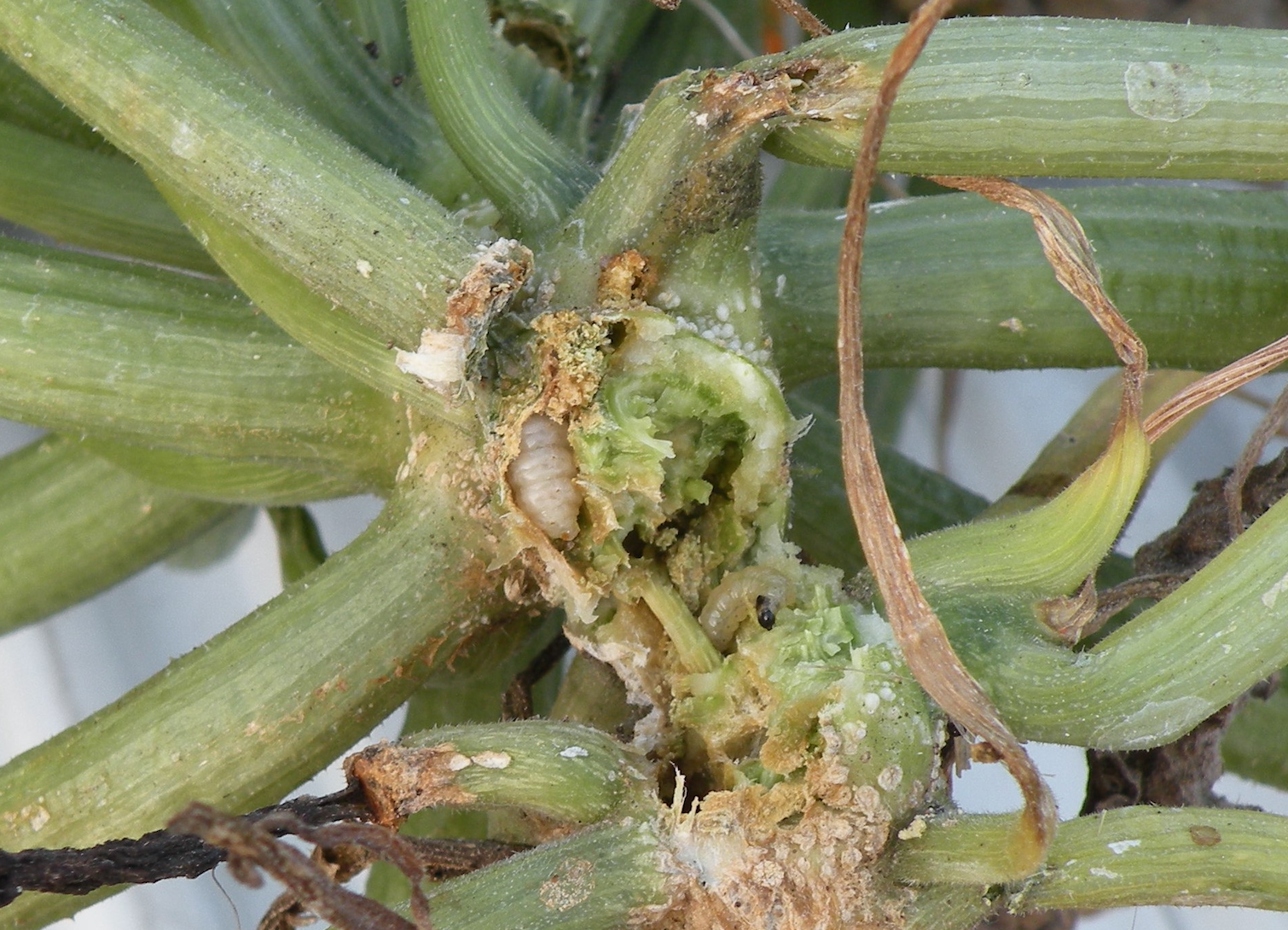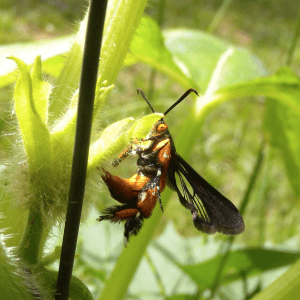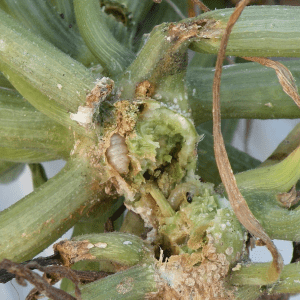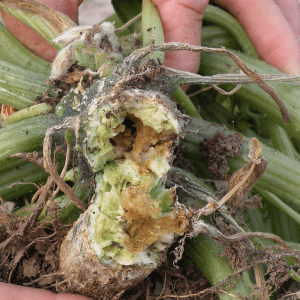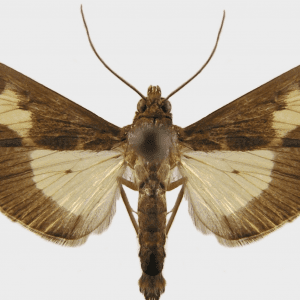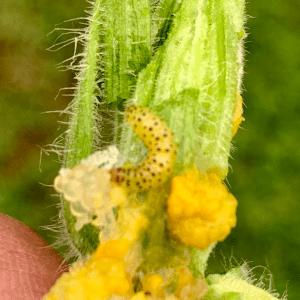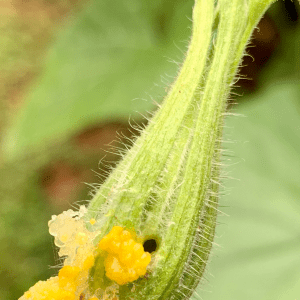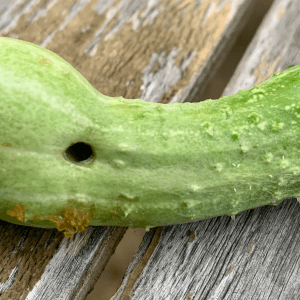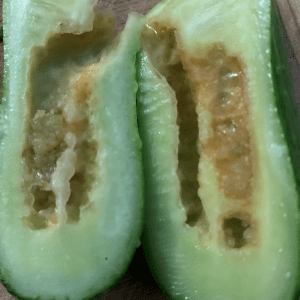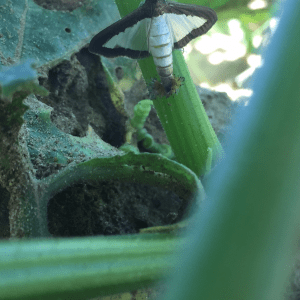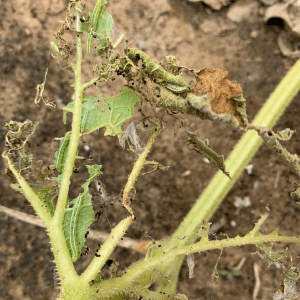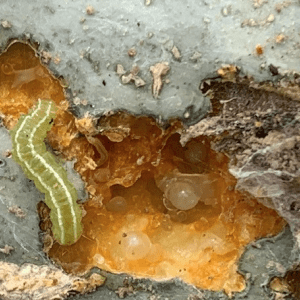Farming

Squash and various cucurbits grown in Alabama are inundated with many major chewing and sucking insect pests that are favored by the hot and humid environment. Insect pests build up over years and also within the growing season resulting in multiple overlapping generations and steep increases in crop damage. Damage from squash vine borers (SVB, Melittia cucurbitae), pickleworms (PW, Diaphania nitidalis), and melonworms (MW, Diaphania hyalinata) is particularly frustrating since proper identification can be difficult, and fruit damage is irreversible without timely intervention. In recent years, flash and prolonged droughts in Alabama increased insect activity and damage.
The following describes some crucial physical and behavioral identification tactics to distinguish these three borers that will be useful for small producers as well as home or market gardeners. Readers are encouraged to check out the squash production and IPM videos on the Farming Basics Mobile App for seeing ideas in action.
How to Identify Squash Vine Borers, Pickleworms, Melonworms
| Description | Squash Vine Borer (SVB) | Pickleworm (PW) | Melonworm (MW) |
|---|---|---|---|
| Moth identification | Clear-winged moth with bright orange scales on abdomen and legs (Fig. 1). | Large moths with semi-transparent yellowish wings and dark wing borders (Fig. 4). Male and female moths have tufts of hair at the end of their dark abdomen. | Large moths with white semi-transparent wings with dark borders (Fig. 9). Male and female moths have tufts of hair at the end of their dark abdomen |
| Activity period | Moths fly in broad daylight and looks/behave like wasps. | Moths are active at dusk and can be seen sitting on stems with outstretched wings. | Moths are active at dusk and can be seen sitting on stems with outstretched wings. |
| Overwintering & migration pattern | Overwinters as pupae and builds up in soil over the years. Moths start flying early in spring. | Migratory moth causing late season outbreak on crops. Storms and strong winds can help disperse moths earlier in the season. | Migratory moth causing late season outbreak on crops. Storms and strong winds can help disperse moths earlier in the season. |
| Number of generations | There are 1-2 overlapping generations depending on location. | Four generations per year | Three generations per year |
| Female egg laying | Female moths make quick flights at plant bases laying eggs singly (mimics a wasp!). | Moths lay eggs in small clusters on flowers and fruits primarily. | Moths lay eggs in small clusters on buds, stems and leaves. |
| Larval identification | The eggs hatch into creamish larvae that quickly bore into the hollow stem (Fig. 2) and makes the plant its home. Larva spends its entire time inside the stem protected from insecticide applications; it only emerges to pupate in the soil near the plant. | Only young instar larvae have series of black spots on greenish body (Fig. 5); mature larvae do not have spots and may become dark colored. Larvae bore into the reproductive structures creating holes (Fig. 6). | Larvae are colorless when small, but the late instar larvae have two white lines on top over a green body (Fig. 10). |
| Feeding damage | Almost never feed on squash flowers or fruits, though some exit holes may be seen higher up from the ground on stems. Larval feeding makes the plants weak (Fig. 3) and they often succumb to heat stress during drought as the plant vascular system is badly affected. | Larval feeding on fruits causes one or more holes (Fig. 7) and extensive tunneling inside fruits (Fig. 8). | Larvae hide under silken threads during the day on leaves. Larvae can completely defoliate plants, leaving the large leaf veins (Fig. 10). Larvae may feed on the surface of fruits (Fig. 11) before moving inside. |
- Figure 1. SVB adult (B. S. Richter, UF, Bugwood.org)
- Figure 2. SVB larva
- Figure 3. SVB larva
- Figure 4. Pickleworm moth (Natasha Wright, Bugwood.org)
- Figure 5. Pickleworm larva
- Figure 6. Pickleworm hole
- Figure 7. Pickleworm damage
- Figure 8. Pickleworm tunnel
- Figure 9. Melonworm moth
- Figure 10. Melonworm leaf damage
- Figure 11. Melonworm fruit damage
Overall Scouting Recommendations
Look for SVB eggs at the plant bases, but watch for the wasp-like moths as they hover around quickly dropping eggs. PW and MW moths rest on stems inside squash canopy during the day and may take quick flights if disturbed (they do not hover like SVB). Look for eggs masses of PW and MW under the leaves. When in doubt, take good pictures with your phone and send them to Alabama Extension commercial horticulture team for quick diagnosis.
More Information
For those in Alabama, the Farming Basics Mobile App is a great tool for looking up insect pest information and connecting with regional Extension agents. Also, subscribing to the Alabama IPM Communicator Newsletter can help you stay informed about training events, crop production, and pest alerts.
This research and educational program is funded by grants from the Alabama Department of Agriculture and Industries Specialty Crops Block Grant, USDA SARE, OREI and Beginning Farmer Programs.

